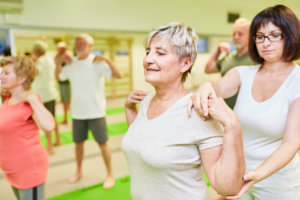Here are a few tips on how you and your family can stay healthy.

For more information, one of our associates will be happy to go into more detail about your specific concern:
– Physiotherapy and Youth (Paediatrics)
To protect kids and teens from back injuries when using a backpack, they should wear both shoulder straps and keep it light. Being over weight is hard on young bones and joints. They should be physically active everyday and watch what they eat. And when they’re at the computer, keep the screen at eye level and the keyboard and mouse at elbow height. Stand and move around every half hour.
– Physiotherapy and Aging (Geriatrics)
Stay active as you get older. To prevent falls, challenge your equilibrium and balance. Use a physio ball, stand on one leg, or walk a line. Energize yourself after sitting for a long time – get up, stretch, flex your arms and legs. And keep active at a pace that is best for you by doing strength and cardiovascular exercises.
– Physiotherapy and Sports
If you’re active, use an exercise program that’s tailored to your sport. Include strength, balance, and core stability. To get muscles and joints ready for action, use the same movements as your sport. Start out slowly, and increase speed and intensity over time. And for minor aches and pains, use an ice pack for up to 15 minutes to help regenerate for the next day.
– Physiotherapy and Women’s Health
For those recovering from breast cancer, start an exercise program that helps regain normal shoulder range of motion. As well, motion will help the lymphatics work to minimize swelling in the arms. Women of all ages will benefit from specific exercises for bladder and bowel control. And for osteoporosis, a regular exercise program will help build stronger bones and prevent fractures.
– Physiotherapy and the Workplace
To stay healthy at work and prevent back injury, lift with bent knees and tight stomach. And hold weight close to your body. Standing or sitting tall not only improves your breathing and prevents pain – you’ll look and feel better. Keep computer monitors at eye level and the keyboard and mouse at elbow level. Take breaks to stretch and relax.
– Physiotherapy and Mobility (Neurosciences)
To recover movement and function after an injury or stroke, your exercise program should challenge your brain and nerves, as well as muscles, balance and coordination. Break complex movements like stair climbing into small, manageable pieces. And be aware when you’re feeling tense, or relaxed. When you’re aware, you have better control and you’ll feel better!
– Physiotherapy and Preventing Back and Neck pain
Back and neck pain are common problems for adults. The best way to deal with back, neck and other joint or muscle problems is to prevent them from happening in the first place!
– Chronic Pain
Are you suffering from chronic pain? Here are some simple tips that may help. Physioactive has professionals that can help with grading your exercise to changing your lifestyle and nutrition. We are here to help!
http://www.webmd.com/pain-management/chronic-pain-11/slideshow-pain-tips


